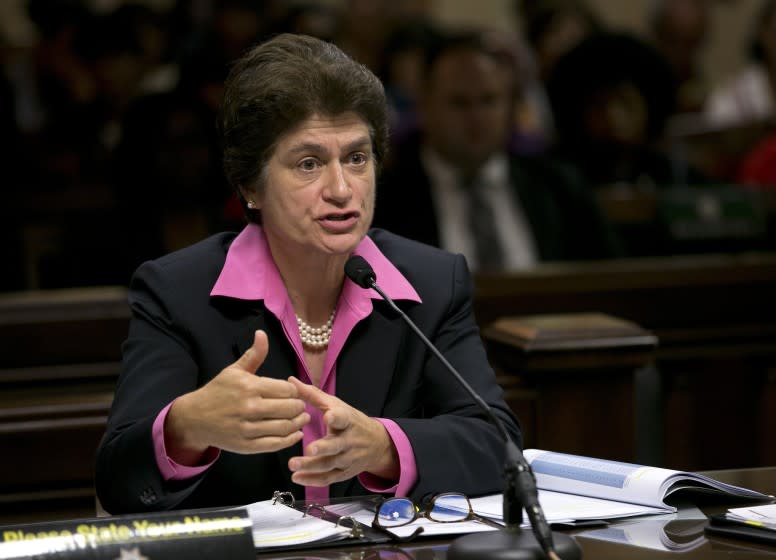Editorial: Improve mental health care before forcing it on people

The Los Angeles County Board of Supervisors and a handful of state legislators have been trying to change California’s landmark mental health laws to make it easier to force treatment on people who don’t want it. But bills to scrap or change the law that limits forced treatment — the Lanterman-Petris-Short Act, signed into law by Gov. Ronald Reagan in 1967 — haven’t made it through the Legislature.
So last year critics tried a different tack: Require an official audit of “LPS” and how it operates in L.A. and two other counties, presumably to show how badly the act fails, and how outdated the notion is that people should have more say in choosing their own mental health treatments.
Instead, the audit — released late last month — found that the act gives counties all the authority they need to treat people in crisis. The real problem, the audit found, is not the patients’ right to self-determination, but the failure of the state and counties to provide sufficient ongoing care and housing after the forced treatment ends. Without those services, patients end up in a dismal and destructive cycle — careening from a 72-hour “5150” hold to the street, to another mental health crisis that endangers themselves or others, and back to another three-day hold. Each new breakdown can cause further lasting damage.
Counties sometimes obtain renewable yearlong conservatorships but don’t provide sufficient treatment, often because it is unavailable.
Perhaps it’s time for LPS critics to rethink their approach. The state has to find a way to fund, and counties to provide, ongoing mental health care. Sufficient and humane services (and housing, when needed) that leave patients a voice in important decisions and don’t make them feel trapped could go a long way toward meeting the state’s mental health challenge.
There can be no doubt that California is in the midst of a mental health emergency. Serious mental illness afflicts a significant portion of the state’s huge homeless population, although — contrary to a widespread perception — far less than half of the tens of thousands of people on the streets. Between 30% and 40% of jail inmates also suffer a significant mental health condition. Less noticed are the families doing their best to care for a stricken relative. The COVID-19 crisis and the companion isolation and anxiety only exacerbate the condition of people already struggling with psychological problems.
Like other states, California once had a robust but deeply flawed system of mental hospitals that largely kept patients out of public view but too often failed to properly treat them. Forced treatment in warehouse-type institutions was phased out and was to be replaced by community-based outpatient or, when necessary, inpatient treatment.
But the community services never materialized to match the volume of need.
The LPS law, fully implemented in the 1970s, limited the state’s ability to institutionalize people and to treat them against their will.
Now the debate over mental health care too often breaks down along ideological lines over the question of which is paramount — a person’s liberty and self-determination, or that person’s health and well-being. The results are often surprising. Conservatives might be expected to promote individual rights. If requiring a mask during a pandemic is an unwarranted intrusion on liberty, for example, how much more so is government-enforced psychiatric treatment? Yet many conservatives and other skeptics of government find themselves pressing for re-institutionalization. Liberals who might support masks and government-ordered business closures appear split on compelled mental health treatment.
Beyond ideology, California has a serious shortage of mental health services in any setting. LPS doesn’t require the counties or the state to fix that problem. Some county mental health professionals want the act amended to compel them to provide care, because only then, they argue, will counties step up — to avoid costly lawsuits.
And there is indeed a crisis, not addressed by LPS, of mentally ill people who are slowly deteriorating but don’t recognize their condition (or don’t care) and are not undergoing the kind of breakdown that the law deems fair game for a 5150 hold. But California's priority should be providing people the services they need, not forcing them to use services that are inadequate to keep them out of the street-to-care-to-street cycle.
There will be no way to fix mental health care on the cheap. The need is profound, but it’s not so much the law standing in the way as it is the failure to live up to the promises of more than half a century ago to provide adequate mental health treatment where it is most effective.

